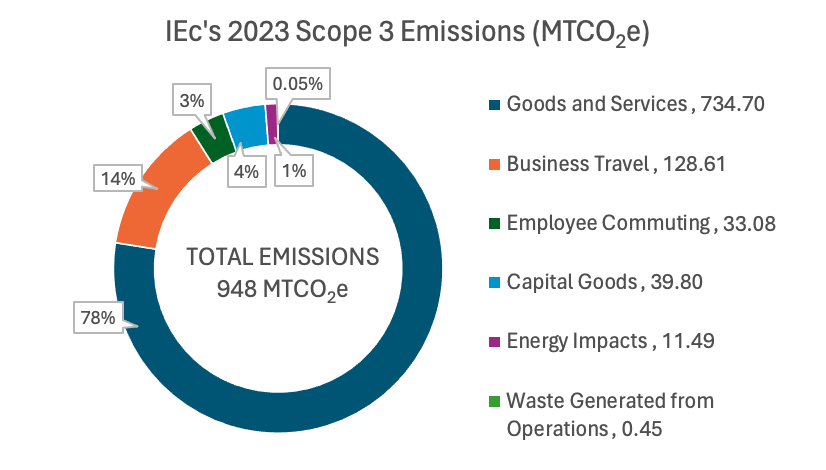Founded in 2008, IEc’s Green Committee consists of employees trained in GHG accounting who track the environmental impact of our facilities and operations and promote initiatives to reduce our impact. In accordance with IEc’s Sustainability Policy, we are committed to:
- Pursuing alternative transportation, energy efficiency, waste minimization, and recycling measures in our workplace;
- Measuring and managing our carbon footprint; and
- Engaging employees to advance sustainability at work, at home, and in our community.
Workplace Sustainability
IEc’s office is located in the Henderson Carriage building, a renovated historic building in a section of Cambridge that is accessible by multiple modes of transit. To promote alternative transportation use, IEc employees can pay for certain commuting expenses on a pre-tax basis and have access to discounted Bluebikes and Zipcar memberships.
Within our office space, IEc promotes energy efficiency with an open floor plan that takes advantage of natural daylight and efficient lighting fixtures throughout. IEc renovated parts of the office, which included installing LED lights, reusing existing furniture where possible and donating the rest to organizations including nonprofits, and using appropriately-certified materials for installation. For example, the drywall is GREENGUARD Gold Certified, carpet is Cradle-to-Cradle Certified, flooring is certified sustainable, paint is low VOC and qualifies for LEED® v4 credit, and dishwashers and fridges are EnergyStar certified and rated for minimal water consumption and are designed to reduce waste. In addition, IEc installed a water fountain to minimize waste from soda cans and water bottles.
IEc also strives to reduce our environmental footprint through aggressive waste minimization and recycling measures. In 2023, IEc generated 1.52 tons of waste. To minimize waste, IEc provides reusable dishware and kitchen towels for employees’ use, gives each new hire a reusable water bottle and tote bag, and offers employees the option of receiving electronic paystubs. In addition, IEc recycles paper, cardboard, plastic bags, and plastic, glass, and metal containers; composts food waste and paper towels; and works with local companies to reuse or safely recycle electronic waste from work and home.
Carbon Footprint
IEc is proud to have achieved carbon neutrality for our office operations (Scopes 1 and 2) by participating in our utility’s renewable power program and purchasing Build New RECs since 2019. IEc calculates our carbon footprint annually by tracking Scope 1, 2, and 3 emissions. For 2023, IEc expanded Scope 3 calculations from business travel and employee commuting to also include goods and services, capital goods, energy impacts, and waste. Given the expansion of our Scope 3 calculations, IEc’s carbon footprint for 2023 is the new baseline year for future analyses. Since IEc is carbon neutral for Scopes 1 and 2, Scope 3 comprises all of IEc’s emissions. The results of this analysis allow us to examine carbon-intensive practices and inform IEc’s carbon reduction strategy. IEc purchased carbon credits to offset our Scope 3 employee commuting and business travel emissions for 2022. IEc intends to purchase carbon credits to offset these Scope 3 emissions categories again for 2023.
Employee Engagement
Another key focus of IEc’s efforts is to encourage employees to pursue sustainability at home and in our community. To do so, IEc sponsors a series of employee-led “skill shares” on how to integrate more environmentally friendly practices into everyday activities. Examples of recent skill shares include cooking with local ingredients, eco-friendly shopping, bike maintenance, gardening, and composting.